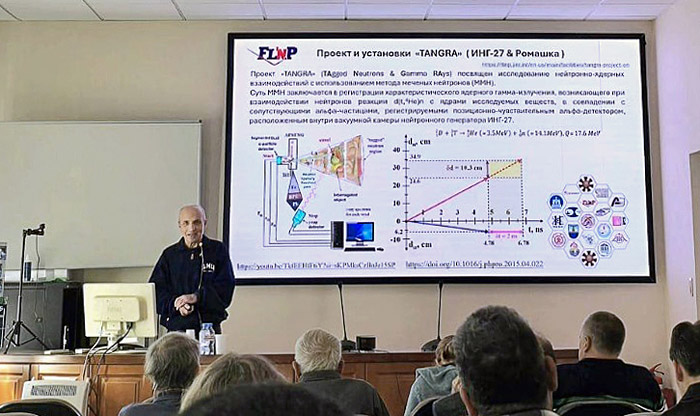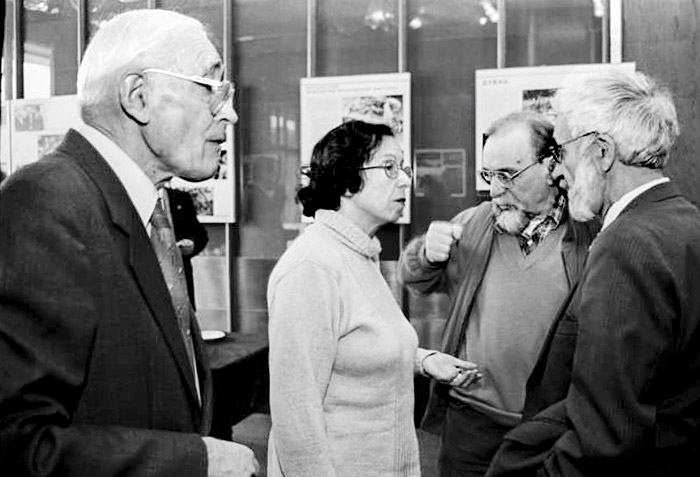
Electronic english version since 2022 |
The newspaper was founded in November 1957
| |
|
Number 42 (4740) |
Seminars
Ivan Ruskov: "Remember the past, think about the future"
On 25 September, a seminar of the Department of Nuclear Physics was held at FLNP. At this seminar, a senior researcher at FLNP and the Institute for Nuclear Research and Nuclear Energy of the Bulgarian Academy of Sciences (Bulgaria) Ivan Ruskov presented the report "Current state and possible future application of NaI (Tl) multi-crystal gamma-quanta detection systems at FLNP JINR".
He started his speech with memories of his teachers - Natalya Yaneva, her husband Alexander Lukyanov, the first employees of FLNP and the first Bulgarian employees of the Laboratory. The speech was accompanied by numerous archival photographs and screenshots of publications in the newspaper "For Communism" ("Dubna: Science, Commonwealth, Progress").
Doctor of Physical and Mathematical Sciences Natalya Yaneva is well known and remembered at the Joint Institute. Her PhD thesis that she successfully defended in 1971, was prepared under the supervision of F.L.Shapiro. Neutron data became the topic of her doctoral thesis, defended in 1985. Later, N.B.Yaneva was a member and Chairman of the Programme Advisory Committee for Nuclear Physics at JINR for many years. She worked at INRNE until the end of her life, taught at Sofia University and trained graduate and PhD students. She presented scientific reports at international conferences and participated in discussions on increasing public awareness of neutron physics and nuclear energy. Her husband, professor, doctor of physical and mathematical sciences A.A.Lukyanov was the founder and first Head of the Department of Calculation and Design of nuclear power plant reactors at MEPhI, worked at IPPE (Obninsk), taught a course in neutron and reactor physics at the Sofia University named after St. Kliment Ohridski and established a scientific school for estimating the impact of resonance effects on the properties of reactors.

I.Ruskov spoke about the history of development and application of "Romashka"-type multi-detector NaI(Tl) scintillation systems. Within the framework of cooperation between INRNE BAS, the Kurchatov Institute and JINR, such gamma spectrometers were developed under the supervision of G.V.Muradyan at INRNE and FLNP and were used for many years to obtain high-precision nuclear data by an international team of scientists. Using the experience accumulated with such systems, the low-background "BG-Romashka" for elemental analysis of environmental samples with a special crystal geometry and almost 100% (98%) geometric efficiency of gamma-quanta registration was developed at INRNE. In 2014, it was transported from Bulgaria to FLNP, where it was positioned on beamline №4 of the neutron time-of-flight spectrometer of the IREN facility. The first results of the detector tests were reported that same year at the ISINN-22 Conference, after which investigations on the spectrometer were suspended as the researchers turned to developing alternative gamma spectroscopy systems.
The speaker recalled the plot of the sad fairy tale by G.H.Andersen "Romashka", calling on those gathered to change the fate of the "Romashkas" in FLNP, so that they do not end their days in dust, like that daisy in the fairy tale. "There is no need to destroy what works! What experiments we will carry out depends only on our imagination," he urged.
V.I.Furman objected to the speaker: "Life develops very fast. With advanced germanium detectors and the corresponding electronics, it is possible to implement research on a completely different level; they allow registering gamma cascades. It is like comparing the Ural computer that was at FLNP when I came here as a graduate student, with advanced supercomputers." Ivan agreed with one of his teachers: "Yes, we live in a very rapidly changing world. We can dream, but within the budget and maybe it is worth considering the multiple difference in the cost of the Romashka detectors and current germanium ones." After the speech, we talked to the speaker for a while.
In what capacity did you arrive this time?
- I arrived on a "business trip" while on unpaid leave. The decision on a business trip is made by the joint Bulgaria - JINR Committee at the Bulgarian Nuclear Regulatory Agency. Today, about ten Bulgarian institutes cooperate with the Joint Institute. We currently have the opportunity to go and work in any scientific centre in Europe, yet we prefer to return to Dubna, for firstly, Bulgaria is one of the founding states of JINR, secondly, our friends work here and thirdly, we speak related languages, have similar customs and culture.
In a few months, I will be 70 years old. De jure and de facto, I am a pensioner, but I work part-time at the Institute of Nuclear Research and Nuclear Energy of the BAS that still collaborates with the Institute's Laboratories on various programmes. As the coordinator of the international TANGRA project, I participate in the implementation of the programme tasks of this project to the best of my ability, but I do not want to limit myself to just it. Science cannot be divided into separate pieces of projects, like a butcher divides a carcass. That is why I have decided to speak at the Laboratory, in order to prevent such an attitude towards the assembled, although some call it "retro", facility. It can easily be made operational, it can be handed over for scrap metal, or it can be used for educational purposes.

Yu.S.Zamyatnin, N.B.Yaneva, Yu.P.Popov and V.I.Furman, 2000. Photo by Yury TUMANOV
I will give an example. A long time ago, when our teachers were still alive, Yury Zamyatnin was brought a fission chamber from the Kurchatov Institute, constructed in 1949-1950 (https://elib.biblioatom.ru/text/mostovoy_2017/p109/). V.I.Mostovoy delivered it to JINR in his car and said to me: "Ivan, everything falls apart there, come on, here in Dubna you will be responsible custodian of it." I successfully defended my thesis, my secondment in 2000 ended and in order to come to JINR again, I had to return to Bulgaria for a year. Such were our secondment rules at that time. I asked to store the chamber until my return. As a result, today, this double pulse ionization fission chamber with Frisch grids and gold-plated electrodes takes a place of honor in the Kurchatov Institute museum.
You see the situation from the point of view of your generation, but what do young people in Bulgaria think?
- I also talk about young people, but there is little of them in science today. There are probably more than 50 political parties in Bulgaria at present and they all have different attitudes toward Russia. The IRT-2000 research nuclear reactor in Sofia was "shutdown" on 13 July, 1989 and because of the "democratic" changes in politics, science in Bulgaria began to focus more on Europe, that is, without developing anything new, they began to destroy the old working relations. The present evaluates the past and by accepting the lessons of the past, we can make plans for the future, taking into account the mistakes made. We live in a very rapidly changing world of information, knowledge, we need to learn and relearn all the time.
If we return to "Romashka" in FLNP…
- Since I do not know how long I will be able to come and work at JINR, I would like to pass on the memory of all our colleagues that have gone to another dimension but are still in our hearts to the colleagues of the present generation. I do not know if I will be able to convince them that it is necessary to remember the past while thinking about the future.
I do not understand this approach when they say: why do we need NaI (Tl) detectors if we can buy LaBr3 (Ce)? Yes, we can, but a detector for almost 30 thousand dollars! For this money, you can buy 6-8 NaI (Tl) detectors and measure the same thing with worse energy resolution, but with better speed and efficiency. Is this old "Romashka" that was constructed in Bulgaria to study the radioactive contamination of environmental objects valuable? Yes! And the most valuable thing in it, no matter how strange it may seem, is its lead shielding that can be used to protect against gamma radiation. This is ultra-pure lead that is nowhere to be found today and it is no coincidence that it was the first to "disappear" from the facility. To make the protective collimator, they used lead coating from the roofs of ancient churches in Bulgaria that during the Turkish yoke were constructed underground and only half a floor rose above the surface.
The funniest thing is that today, the results of experiments are compared to the ones obtained decades ago on the devices of the vacuum tube era. If I were Directorate, I would say the following: first, construct a new good device, then say that the old one is not needed, and this one and that one can be used in the new device. Or give it to a museum that is the wisest solution. There are free rooms in FLNP where it would be possible to make a museum of science and technology of the Laboratory with the possibility of demonstrating physical devices to schoolchildren that they could touch with their hands.
In your speech, you have tried to cover several completely different topics…
- I really love the philosophy of physics. Do you remember that in 2021, the Symposium "Science. Philosophy. Religion" (https://www.jinr.ru/posts/simpozium-nauka-filosofiya-religiya/) was held here? It was a very interesting event, we need to talk about philosophy in physics, since technologically we have exhausted almost everything, we need to turn to spirituality. And we need to consider not only the concept of "Matter-Energy-Space-Time" that we were taught, but also the one that we were not taught, namely, "Matter-Information-Measure". But we can talk about this concept another time!
Olga TARANTINA